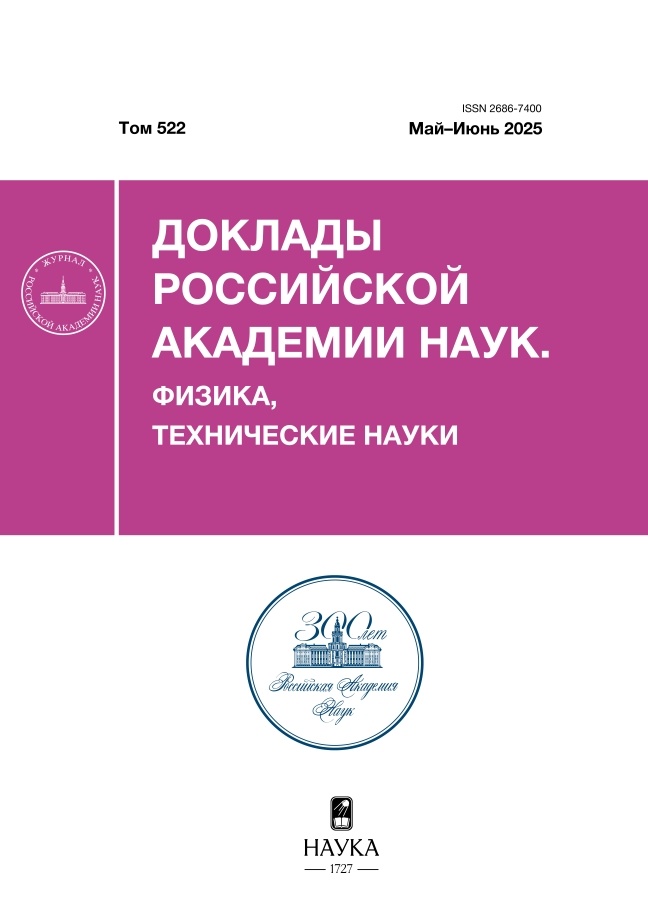Детекция фитопатогенов на семенах хлопчатника и их дезинфекция с помощью водных растворов, обработанных низкотемпературной плазмой пьезоэлектрического прямого разряда
- Авторы: Ашуров М.Х.1, Глинушкин А.П.2,3, Захаров Д.А.2, Колик Л.В.2, Кончеков Е.М.2,4, Матвеева Т.А.2, Саримов Р.М.2, Семенова Н.А.2, Серов Д.А.2,5, Шумейко С.А.2, Яныкин Д.В.2,6
-
Учреждения:
- Институт ядерной физики Академии наук Республики Узбекистан
- Институт общей физики им. А.М. Прохорова Российской академии наук
- Институт органической химии им. Н.Д. Зелинского Российской академии наук
- Российский университет дружбы народов
- Пущинский научный центр Биологических исследований, Институт биофизики клетки Российской академии наук
- Пущинский научный центр Биологических исследований, Институт фундаментальных проблем биологии Российской академии наук
- Выпуск: Том 522, № 1 (2025)
- Страницы: 65-70
- Раздел: ТЕХНИЧЕСКИЕ НАУКИ
- URL: https://ter-arkhiv.ru/2686-7400/article/view/689523
- DOI: https://doi.org/10.31857/S2686740025030101
- EDN: https://elibrary.ru/PVZCWC
- ID: 689523
Цитировать
Полный текст
Аннотация
Воздействие низкотемпературной плазмы, инициируемой разрядом пьезотрансформатора, на биологические и водосодержащие объекты является перспективным методом дезинфекции посадочного материала и регуляции роста. В статье показано, что плазменно-активированная вода, созданная таким методом, значительно подавляет активность фитопатогенов Xanthomonas citri pv. Malvacearum, Verticillium dahlia и Fusarium oxysporum f.sp. vasinfectum на семенах хлопчатника. Фитопатогены идентифицировались с помощью ПЦР в реальном времени и микроскопии. Для эффективного применения водных растворов, обработанных низкотемпературной плазмой в полевых условиях, разработан флуоресцентный метод детекции данных фитопатогенов.
Полный текст
Об авторах
М. Х. Ашуров
Институт ядерной физики Академии наук Республики Узбекистан
Автор, ответственный за переписку.
Email: ashurov49@mail.ru
иностранный член РАН
Узбекистан, пос. Улугбек, Ташкент
А. П. Глинушкин
Институт общей физики им. А.М. Прохорова Российской академии наук; Институт органической химии им. Н.Д. Зелинского Российской академии наук
Email: ashurov49@mail.ru
академик РАН
Россия, Москва; МоскваД. А. Захаров
Институт общей физики им. А.М. Прохорова Российской академии наук
Email: ashurov49@mail.ru
Россия, Москва
Л. В. Колик
Институт общей физики им. А.М. Прохорова Российской академии наук
Email: ashurov49@mail.ru
Россия, Москва
Е. М. Кончеков
Институт общей физики им. А.М. Прохорова Российской академии наук; Российский университет дружбы народов
Email: eukmek@gmail.com
Россия, Москва; Москва
Т. А. Матвеева
Институт общей физики им. А.М. Прохорова Российской академии наук
Email: ashurov49@mail.ru
Россия, Москва
Р. М. Саримов
Институт общей физики им. А.М. Прохорова Российской академии наук
Email: rusa@kapella.gpi.ru
Россия, Москва
Н. А. Семенова
Институт общей физики им. А.М. Прохорова Российской академии наук
Email: ashurov49@mail.ru
Россия, Москва
Д. А. Серов
Институт общей физики им. А.М. Прохорова Российской академии наук; Пущинский научный центр Биологических исследований, Институт биофизики клетки Российской академии наук
Email: ashurov49@mail.ru
Россия, Москва; Пущино, Московская область
С. А. Шумейко
Институт общей физики им. А.М. Прохорова Российской академии наук
Email: ashurov49@mail.ru
Россия, Москва
Д. В. Яныкин
Институт общей физики им. А.М. Прохорова Российской академии наук; Пущинский научный центр Биологических исследований, Институт фундаментальных проблем биологии Российской академии наук
Email: ashurov49@mail.ru
Россия, Москва; Пущино, Московская область
Список литературы
- Рашидова Д.К., Амантуриев Ш.Б., Рашидова С.Ш. Применение нанополимерных препаратов в повышении урожайности сельскохозяйственных культур. Ташкент: Fan ziyosi, 2023. 254 с.
- Konchekov E.M., Gudkova V.V., Burmistrov D.E., Konkova A.S., Zimina M.A. et al. Bacterial decontamination of water-containing objects using piezoelectric direct discharge plasma and plasma jet // Biomolecules. 2024. V. 14. 181.
- Konchekov E.M., Kolik L.V., Danilejko Y.K., Belov S.V., Artem’ev K.V. et al. Enhancement of the plant grafting technique with dielectric barrier discharge cold atmospheric plasma and plasma-treated solution // Plants. 2022. V. 11. 1373.
- Belov S.V., Danyleiko Y.K., Glinushkin A.P., Kalinitchenko V.P., Egorov A.V. et al. An activated potassium phosphate fertilizer solution for stimulating the growth of agricultural plants // Front. Phys. 2021. V. 8. 618320.
- Ivanov V.E., Usacheva A.M., Chernikov A.V., Bruskov V.I., Gudkov S.V. Formation of long-lived reactive species of blood serum proteins induced by low-intensity irradiation of helium-neon laser and their involvement in the generation of reactive oxygen species // J. Photochem. Photobiol. B. 2017. V. 176. P. 36–43.
- Sharapov M.G., Novoselov V.I., Fesenko E.E., Bruskov V.I., Gudkov S.V. The role of peroxiredoxin 6 in neutralization of X-ray mediated oxidative stress: effects on gene expression, preservation of radiosensitive tissues and postradiation survival of animals // Free Radical Res. 2017. V. 51. № 2. P. 148–166.
- Wang X.Q., Allen T.W., Wang H., Peterson D.G., Nichols R.L. et al. Development of a qPCR Protocol to Detect the Cotton Bacterial Blight Pathogen, Xanthomonas citri pv. malvacearum, from Cotton Leaves and Seeds // Plant Disease. 2019. V. 103. № 3. P. 422–429.
- Atallah Z.K., Bae J., Jansky S.H., Rouse D.I., Stevenson W.R. Multiplex Real-Time Quantitative PCR to Detect and Quantify Verticillium dahliae Colonization in Potato Lines that Differ in response to Verticillium Wilt // Phytopathology. 2007. V. 97. № 7. P. 865–872.
- Abd-Elsalam K.A., Omar M.R., Migheli Q., Nirenberg H.I. Genetic characterization of Fusarium oxysporum f. sp. vasinfectum isolates by random amplification of polymorphic DNA (RAPD) and amplified fragment length polymorphism (AFLP) // J. Plant Diseases and Protection. 2004. V. 111. № 6. P. 534–544.
- Konchekov E.M., Gusein-zade N., Burmistrov D.E., Kolik L.V., Dorokhov A.S. et al. Advancements in Plasma Agriculture: A Review of Recent Studies // Int. J. Mol. Sci. 2023. V. 24. № 20. 15093.
- Gudkov S.V., Matveeva T.A., Sarimov R.M., Simakin A.V., Stepanova E.V. et al. Optical Methods for the Detection of Plant Pathogens and Diseases (Review) // AgriEngineering. 2023. V. 5. № 4. P. 1789–1812.
- Matveeva T.A., Sarimov R.M., Persidskaya O.K., Andreevskaya V.M., Semenova N.A. et al. Application of Fluorescence Spectroscopy for Early Detection of Fungal Infection of Winter Wheat Grains // AgriEngineering. 2024. V. 6. № 3. P. 3137–3158.
- Shcherbakov I.A. Current Trends in the Studies of Aqueous Solutions // Phys. Wave Phen. 2022. V. 30. P. 129–134.
- Lobyshev V.I. Water as a sensor of weak impacts on biological systems // Biophys. Rev. 2023. V. 15. P. 819–832.
- Gorlenko N.P., Laptev B.I., Sarkisov Y.S., Zhuravlev V.A., Sidorenko G.N. et al. The Role of Water and Aqueous Solutions in the Formation of Induction Periods of Hydration and Structure Formation of Cement Stone // Phys. Wave Phen. 2023. V. 31. P. 206–215.
Дополнительные файлы













